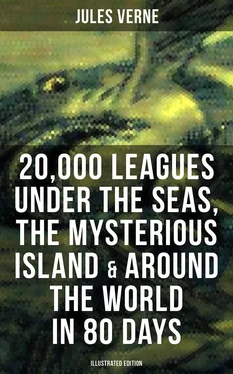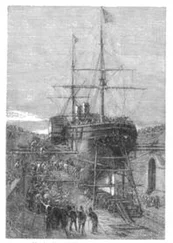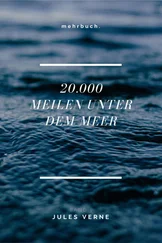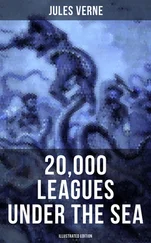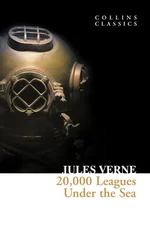The situation was indeed dangerous, but as if by magic, the Nautilus seemed to glide right down the middle of these rampaging reefs. It didn’t follow the exact course of the Zealous and the new Astrolabe, which had proved so illfated for Captain Dumont d’Urville. It went more to the north, hugged the Murray Islands, and returned to the southwest near Cumberland Passage. I thought it was about to charge wholeheartedly into this opening, but it went up to the northwest, through a large number of little-known islands and islets, and steered toward Tound Island and the Bad Channel.
I was already wondering if Captain Nemo, rash to the point of sheer insanity, wanted his ship to tackle the narrows where Dumont d’Urville’s two sloops of war had gone aground, when he changed direction a second time and cut straight to the west, heading toward Gueboroa Island.
By then it was three o’clock in the afternoon. The current was slacking off, it was almost full tide. The Nautilus drew near this island, which I can see to this day with its remarkable fringe of screw pines. We hugged it from less than two miles out.
A sudden jolt threw me down. The Nautilus had just struck a reef, and it remained motionless, listing slightly to port.
When I stood up, I saw Captain Nemo and his chief officer on the platform. They were examining the ship’s circumstances, exchanging a few words in their incomprehensible dialect.
Here is what those circumstances entailed. Two miles to starboard lay Gueboroa Island, its coastline curving north to west like an immense arm. To the south and east, heads of coral were already on display, left uncovered by the ebbing waters. We had run aground at full tide and in one of those seas whose tides are moderate, an inconvenient state of affairs for floating the Nautilus off. However, the ship hadn’t suffered in any way, so solidly joined was its hull. But although it could neither sink nor split open, it was in serious danger of being permanently attached to these reefs, and that would have been the finish of Captain Nemo’s submersible.
I was mulling this over when the captain approached, cool and calm, forever in control of himself, looking neither alarmed nor annoyed.
“An accident?” I said to him.
“No, an incident,” he answered me.
“But an incident,” I replied, “that may oblige you to become a resident again of these shores you avoid!”
Captain Nemo gave me an odd look and gestured no. Which told me pretty clearly that nothing would ever force him to set foot on a land mass again. Then he said:
“No, Professor Aronnax, the Nautilus isn’t consigned to perdition. It will still carry you through the midst of the ocean’s wonders. Our voyage is just beginning, and I’ve no desire to deprive myself so soon of the pleasure of your company.”
“Even so, Captain Nemo,” I went on, ignoring his ironic turn of phrase, “the Nautilus has run aground at a moment when the sea is full. Now then, the tides aren’t strong in the Pacific, and if you can’t unballast the Nautilus, which seems impossible to me, I don’t see how it will float off.”
“You’re right, professor, the Pacific tides aren’t strong,” Captain Nemo replied. “But in the Torres Strait, one still finds a meter-and-a-half difference in level between high and low seas. Today is January 4, and in five days the moon will be full. Now then, I’ll be quite astonished if that good-natured satellite doesn’t sufficiently raise these masses of water and do me a favor for which I’ll be forever grateful.”
This said, Captain Nemo went below again to the Nautilus’s interior, followed by his chief officer. As for our craft, it no longer stirred, staying as motionless as if these coral polyps had already walled it in with their indestructible cement.
“Well, sir?” Ned Land said to me, coming up after the captain’s departure.
“Well, Ned my friend, we’ll serenely wait for the tide on the 9th, because it seems the moon will have the good nature to float us away!”
“As simple as that?”
“As simple as that.”
“So our captain isn’t going to drop his anchors, put his engines on the chains, and do anything to haul us off?”
“Since the tide will be sufficient,” Conseil replied simply.
The Canadian stared at Conseil, then he shrugged his shoulders. The seaman in him was talking now.
“Sir,” he answered, “you can trust me when I say this hunk of iron will never navigate again, on the seas or under them. It’s only fit to be sold for its weight. So I think it’s time we gave Captain Nemo the slip.”
“Ned my friend,” I replied, “unlike you, I haven’t given up on our valiant Nautilus, and in four days we’ll know where we stand on these Pacific tides. Besides, an escape attempt might be timely if we were in sight of the coasts of England or Provence, but in the waterways of Papua it’s another story. And we’ll always have that as a last resort if the Nautilus doesn’t right itself, which I’d regard as a real calamity.”
“But couldn’t we at least get the lay of the land?” Ned went on. “Here’s an island. On this island there are trees. Under those trees land animals loaded with cutlets and roast beef, which I’d be happy to sink my teeth into.”
“In this instance our friend Ned is right,” Conseil said, “and I side with his views. Couldn’t master persuade his friend Captain Nemo to send the three of us ashore, if only so our feet don’t lose the knack of treading on the solid parts of our planet?”
“I can ask him,” I replied, “but he’ll refuse.”
“Let master take the risk,” Conseil said, “and we’ll know where we stand on the captain’s affability.”
Much to my surprise, Captain Nemo gave me the permission I asked for, and he did so with grace and alacrity, not even exacting my promise to return on board. But fleeing across the New Guinea territories would be extremely dangerous, and I wouldn’t have advised Ned Land to try it. Better to be prisoners aboard the Nautilus than to fall into the hands of Papuan natives.
The skiff was put at our disposal for the next morning. I hardly needed to ask whether Captain Nemo would be coming along. I likewise assumed that no crewmen would be assigned to us, that Ned Land would be in sole charge of piloting the longboat. Besides, the shore lay no more than two miles off, and it would be child’s play for the Canadian to guide that nimble skiff through those rows of reefs so illfated for big ships.
The next day, January 5, after its deck paneling was opened, the skiff was wrenched from its socket and launched to sea from the top of the platform. Two men were sufficient for this operation. The oars were inside the longboat and we had only to take our seats.
At eight o’clock, armed with rifles and axes, we pulled clear of the Nautilus. The sea was fairly calm. A mild breeze blew from shore. In place by the oars, Conseil and I rowed vigorously, and Ned steered us into the narrow lanes between the breakers. The skiff handled easily and sped swiftly.
Ned Land couldn’t conceal his glee. He was a prisoner escaping from prison and never dreaming he would need to reenter it.
“Meat!” he kept repeating. “Now we’ll eat red meat! Actual game! A real mess call, by thunder! I’m not saying fish aren’t good for you, but we mustn’t overdo ‘em, and a slice of fresh venison grilled over live coals will be a nice change from our standard fare.”
“You glutton,” Conseil replied, “you’re making my mouth water!”
“It remains to be seen,” I said, “whether these forests do contain game, and if the types of game aren’t of such size that they can hunt the hunter.”
“Fine, Professor Aronnax!” replied the Canadian, whose teeth seemed to be as honed as the edge of an ax. “But if there’s no other quadruped on this island, I’ll eat tiger—tiger sirloin.”
Читать дальше
